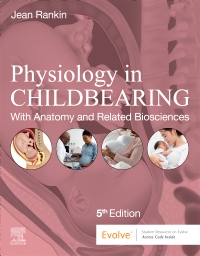
Physiology in Childbearing, 5th Edition
Paperback

This popular book has been fully updated to incorporate new knowledge and guidelines, and has a stronger focus on diversity. It covers basic biochemistry, cellular biology, genetics and fertility, as well as embryology and fetal growth, the physiology of pregnancy, and complications of labour. It then goes on to examine the neonate, infant feeding and bio-behavioural aspects of parenting.
The complexities of this fundamental topic area are explained with boxes of key points, full colour diagrams and images, and tips on applying content to practice, making this book a must-have for students and practising midwives alike.
-
- Covers everything midwives need to know about physiology – comprehensive content suitable for both training and practising midwives
- Easy to read with straightforward language - ideal for students to master difficult concepts
- Clear, full-colour diagrams and images bring theory to life
- Demystifies basic biochemistry, cellular biology and genetics for those who have no prior knowledge of these subject areas
- Evidence-based approach to improve safety and quality of care for mothers and babies, both in the developed world and those countries where the provision of adequate care remains limited
- Helps the reader apply theory to practice, including how to recognise pathology and help prevent morbidity and mortality
- ‘Main Points’ boxes and online question bank with downloadable image collection to support learning
-
Section 1: Preconception
1. Basic Biochemistry
2. The Cell – Its Structures and Function
3. Structure, Organization and Regulation of Genes
4. The Female Reproductive System
5. The Male Reproductive System
6. Fertility Control
7. Infertility
8. Preconception Matters
Section 2A: Pregnancy—The Fetus
9. General Embryology
10. Embryological Systems 1—Trunk, Head and Limbs
11. Embryological Systems 2—Internal Organs
12. The Placenta, Membranes and Amniotic Fluid
13. Fetal Growth and Development
14. Common Fetal Problems
15. Congenital Anomalies
Section 2B: Pregnancy—The Mother
16. The Haematological System—Physiology of the Blood
17. The Cardiovascular System
18. Respiration
19. The Renal Tract
20. Fluid, Electrolyte and Acid–Base Balance
21. The Gastrointestinal Tract
22. The Accessory Digestive Organs
23. Nutrition and Metabolism During Pregnancy
24. The Nature of Bone—The Female Pelvis and Fetal Skull
25. Muscle—The Pelvic Floor and the Uterus
26. The Central Nervous System
27. The Peripheral and Autonomic Nervous Systems
28. The Endocrine System
29. The Immune System
Section 2C: Pregnancy—The Problems
30. Minor Disorders of Pregnancy and Risk Factors
31. Bleeding in Pregnancy
32. Cardiac and Hypertensive Disorders
33. Anaemia and Clotting Disorders
34. Respiratory, Renal, Gastrointestinal and Neurological Problems
35. Diabetes Mellitus and Other Metabolic Disorders in Pregnancy
Section 3A: Labour—Normal
36. The Onset of Labour
37. The First Stage of Labour
38. Pain Relief in Labour
39. The Second Stage of Labour
40. The Third Stage of Labour
Section 3B: Labour—Problems
41. Abnormalities of Uterine Action and Onset of Labour
42. Breech Presentation
43. Malposition and Cephalic Malpresentations
44. Cephalopelvic Disproportion, Obstructed Labour and Other Obstetric Emergencies
45. Postpartum Haemorrhage and Other Third-stage Problems
46. Perinatal Fetal Asphyxia
47. Operative Delivery and the Acutely Unwell Woman
Section 4A: Puerperium—The Baby as a Neonate
48. Adaptation to Extrauterine Life 1: Haematological, Cardiovascular, Respiratory and Genitourinary Considerations
49. Adaptation to Extrauterine Life 2: Gastrointestinal, Metabolic, Neural and Immunological Considerations
50. Health Challenges and Problems in Neonates of Low Birthweight
51. Developmental Anatomy: Related Cardiovascular and Respiratory Disorders
52. Jaundice and Common Metabolic Problems in Neonates
53. Risks of Infection and Trauma in Neonates
Section 4B: Puerperium—The Mother
54. The Breasts and Lactation
55. Breastfeeding Practice and Problems
56. The Puerperium
57. Biobehavioural Aspects of Parenting


 as described in our
as described in our 